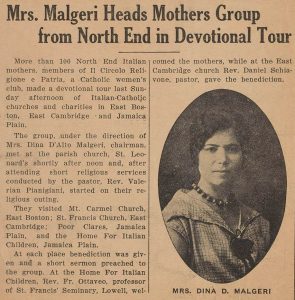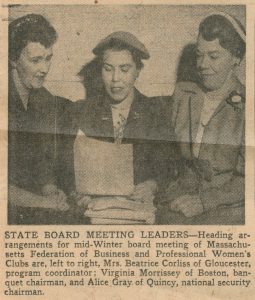By Susan Martin, Senior Processing Archivist
I’d like to use the blog today to highlight two manuscript collections that recently crossed my desk, collections that document the work of two very impressive and accomplished women.
The first is the papers of social workers Dina D’Alto Malgeri and Francesco P. Malgeri. During the early and mid-twentieth century, the Malgeris, both immigrants from Italy, devoted themselves to the Italian immigrant communities in their adopted homes of Boston and Chicago. The collection consists mostly of papers of Dina Malgeri, who survived her husband by 49 years.

Dina Malgeri worked tirelessly to help immigrants access educational and employment opportunities, government and medical assistance, and recreational activities. She taught English, Italian, and citizenship classes; organized clubs for children and adults; translated and interpreted; led cultural tours and outings; delivered lectures; and even wrote and directed plays. It seems wherever she saw a need, she stepped up.
One of the nice things about the Malgeri papers is that the MHS’s crack digital team has digitized the collection in its entirety, and you can access these images through our collection guide. There you’ll find papers of many of the associations with which Dina was affiliated, as well as papers documenting her efforts to help individuals arrange medical care, straighten out legal matters, and become U.S. citizens.
Literally the same day I cataloged the Malgeri papers, I also cataloged the papers of M. Virginia Morrissey McDermott of Medford, Mass., a woman described in her obituary as “a pioneering lawyer, businesswoman and activist for women’s equality.” After graduating second in her high school class, McDermott told her parents she wanted to attend law school. As she described in a 2007 newspaper article, “My father stared out the window for 10 minutes. Then he said, ‘Well, if you want to, I think you have the brains. Go do it.’” In 1939, she proved him right by graduating second in her class again from Portia Law School, now the New England School of Law.
McDermott was the first female secretary of the Newspaper Guild union, treasurer and president of the Newman Club, president of the Massachusetts Federation of Business and Professional Women, nominating committee chair for the National Foundation of Business and Professional Women, member of the Massachusetts Commission on the Status of Women, and Boston’s Woman of the Year. And this is only a partial list. She not only achieved personal success, but devoted her professional life to boosting other women. She fought for the Equal Rights Amendment and was still working as a lawyer in her nineties.
When asked why she didn’t marry until the age of 50, she explained,. “I was just too busy doing everything else to think about it.”
Her papers at the MHS consist mostly of printed matter related to her professional activities. However, the collection ended up having an unexpected personal connection to yours truly. Leafing through miscellaneous clippings from the 1950s and ‘60s, I noticed one in particular that made me stop.

The woman in the middle is Virginia McDermott. The woman on the left is my great-aunt Beatrice Corliss!

